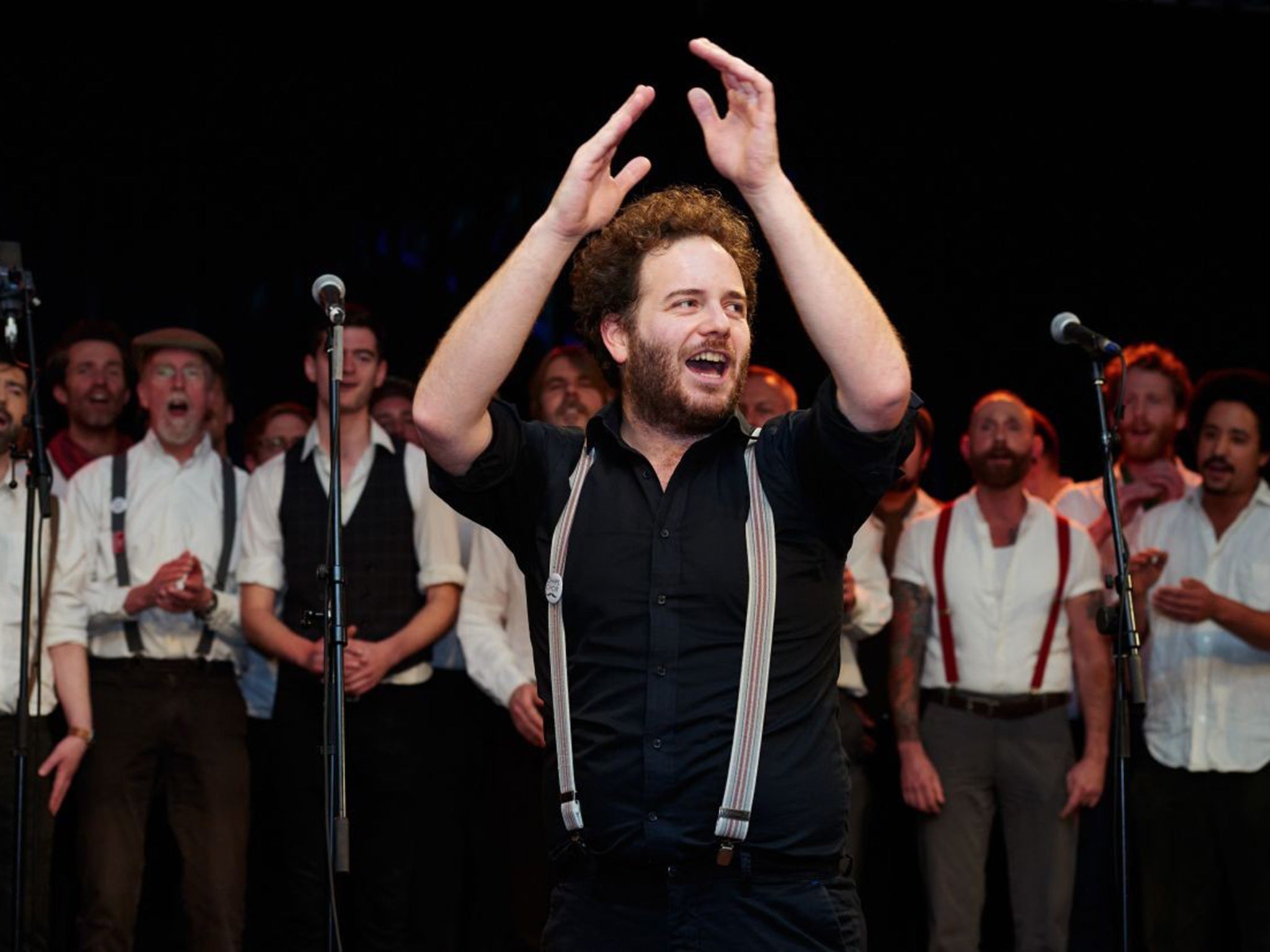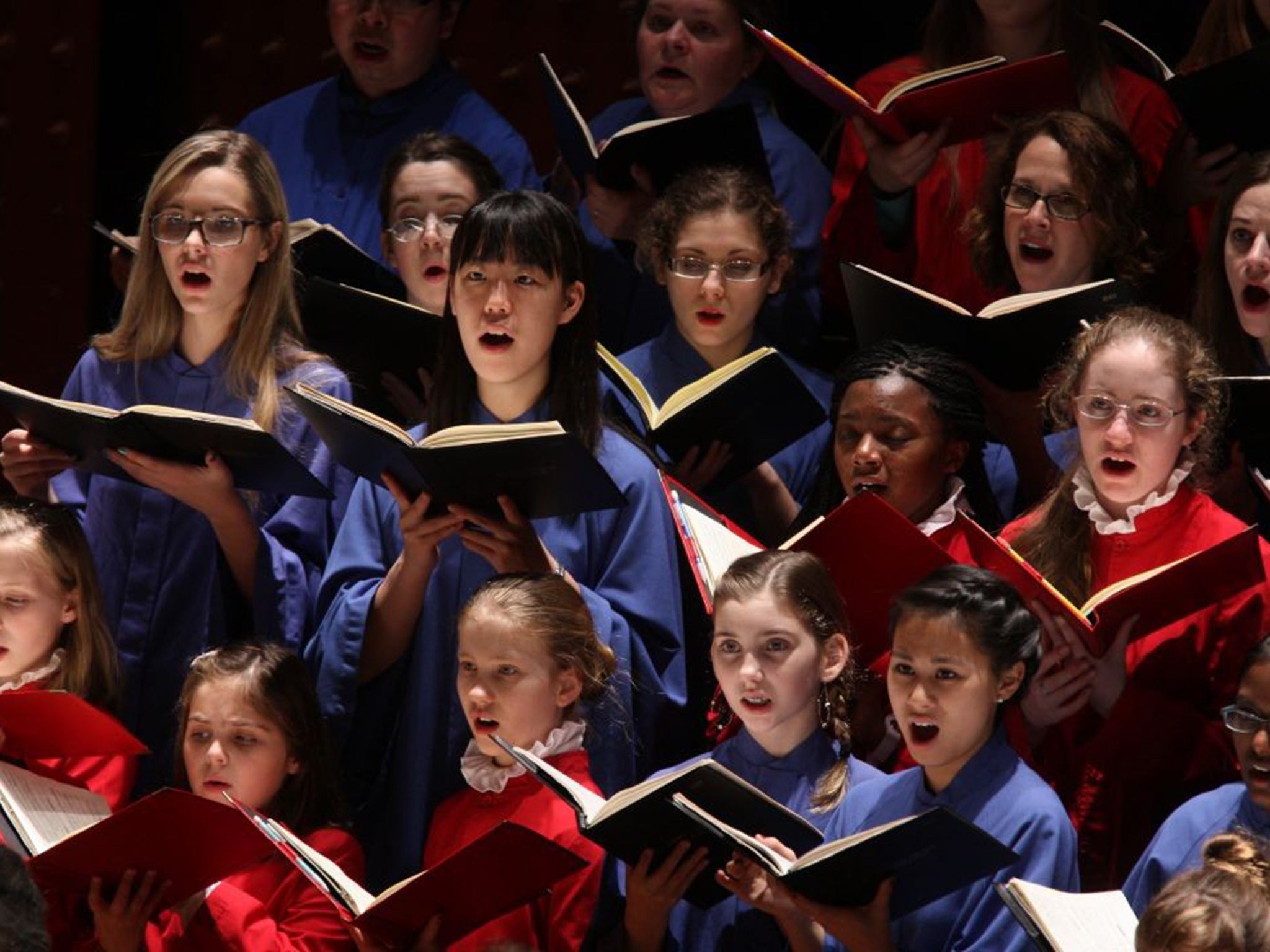Scientific evidence proves that singing with others promotes health - and can be life-changing, too
It's also the best way to meet new people. But what if you hate group activities? Simmy Richman joined the Chaps Choir for two rehearsals, and one potentially life-changing performace

I am standing in a room full of complete strangers. There are around 30 of them and they are all male. The next warm-up exercise we will undertake together consists of belting out the words “Many men, many men, many men men men” to the tune of Rossini’s “William Tell Overture”. Though I am in a familiar part of north London, I am some distance away from my comfort zone.

The scientific evidence is overwhelming: doing this will, apparently, promote my general health, happiness and well-being while simultaneously being the best way known to researchers to meet and bond with new people. The most recent study into group singing, published by a team at Oxford University in October, found that because we rarely, if ever, sing together these days, many people – and especially those living in large cities – feel lonely and socially isolated. Book clubs, craft classes, team sports… all good, the researchers concluded, but nothing lubricates the wheels of social cohesion quite like a good singalong.
On top of the existing research that shows singing with other people triggers “happy” hormones such as oxytocin and lowers stress and blood pressure – as well as having a significant impact on conditions such as Parkinson’s, lung disease and a range of mental-health issues including clinical depression – all the available evidence forms a fairly persuasive argument to join a choir.
Seeing the effect everyone’s voices were having left me quite overcome
And so when, a couple of days after the team at Oxford University published their findings, I receive an invitation to temporarily hook up with a group of singers known as Chaps Choir for two rehearsals and a performance at the Southbank Centre’s Royal Festival Hall, the opportunity to go full gonzo was too good to resist. Which brings us back to that room full of strangers and the raging battle to conquer my natural reluctance to engage in pretty much any form of group activity.
There are, it turns out when I examine this barrier to my own potential health and happiness on the way home, a number of reasons for its existence. Alongside a general lack of respect for authority figures, I am allergic to any activity that feels remotely new agey. So when we are asked to hum, harrumph and hoorah together as part of the process of getting ready to sing, the hairs on the back of my neck start to bristle rather than rise.
Further to that, away from the strict audition processes of the sort of choirs popularised by Gareth Malone, the world of the community choir is largely a place punctuated by language drawn straight from the air-quotes thesaurus. The fact that anyone, regardless of vocal ability, is permitted to join, is referred to as “accessibility”. Choir leaders are called “facilitators”. The building we rehearse in is a “creative space”. Songs are “musical outcomes”. And so on.
It turns out, though, that Dominic Stichbury, the 35-year-old force of nature behind Chaps Choir, knows precisely what he’s doing. A long-time leader of a variety of choirs, he had the idea for Chaps in 2013 and soon noticed that the choir was having some unexpected effects on the men singing in it.
“After our first gig, we came off stage and everyone could feel that it had been amazing and everyone wanted to celebrate in some way,” Stichbury recalls. “Suddenly, one guy shouted ‘group hug’ and 50 men just went into the middle for a huddle. Later, one of the guys said that it was just like the camaraderie and team spirit you get from sports, but for that sort of feeling to happen in, say a football match, you’ve had to stick two fingers up to someone else. When we came off stage for the first time, we all felt like that but there was no losing team.”
By my second week with Chaps Choir, even I am starting to loosen up. At the end of the first rehearsal, Stichbury had encouraged the 30 newcomers who would be sharing a stage with the main choir to record the two songs we would be singing on to our phones. To my surprise and delight, when I listen back to the recording, we sound passable, good even; and that after just an hour and a half of practice.
Enjoy unlimited access to 100 million ad-free songs and podcasts with Amazon Music
Sign up now for a 30-day free trial. Terms apply.
ADVERTISEMENT. If you sign up to this service we will earn commission. This revenue helps to fund journalism across The Independent.
Enjoy unlimited access to 100 million ad-free songs and podcasts with Amazon Music
Sign up now for a 30-day free trial. Terms apply.
ADVERTISEMENT. If you sign up to this service we will earn commission. This revenue helps to fund journalism across The Independent.
At week two I also find myself chatting happily away with some of the other participants, now vaguely familiar faces. In the main, we talk about the songs and our parts in them. Unusually for an all-male environment, there is no mention of work or sports and no sense whatsoever of individual egos.
As the day of the gig approaches, I notice something else. My four-year-old son has been told that he can come and watch me sing and his excitement is contagious. It occurs to me how little our children see of us outside of our role as their parents. When we go out to work, we close the door on them or drop them off at school. They have little or no tangible idea of what it is we do when we get there. The knowledge that my son will see me in an entirely fresh context, taking my part in a public performance, makes me realise, momentarily, what it must feel like for the David Beckhams of this world. Hey kiddo, this is just one of the things your old man can do. Come and watch.
The performance itself is the clincher. Not only does it feel great to be a cog in this wondrous engine of sound, but all the mobile-phone-recorded evidence suggests that we sound pretty special, too. The songs we perform ( a Georgian folk song called “Elesa” and the Magnetic Fields’ “Book of Love”), have been carefully selected by Stichbury to combine ease of learning with maximum impact. The man truly is some kind of musical genius. At the end of the show, my son, his face beaming with a pride, stands up from his seat in the audience and takes a bow together with those of us on the stage.
A few days after the performance, I meet up with Stichbury, who has brought along a friend of his who happens to be a lecturer in sociology at the University of Westminster. When she isn’t teaching, Dr Emily Falconer has been conducting her own research into the effect being part of Chaps Choir has had on its members. A specialist in gender and sexuality, Falconer began to look into what being part of the choir might tell us about men, our relationship to community and each other.
“What is the shared interest of a choir?” she asks. “To begin with it was religion and worship so the shared interest was god. Then, other choirs started meeting for reasons such as political activism, or with a specific purpose in mind: such as choirs consisting of refugees, women who have been in a vulnerable situation and so on. But what is the shared purpose of Chaps? The common aim is just to come and sing but it turns out that is has been a hugely therapeutic environment without it ever specifically being a place where you might ‘come and express your feelings’.”
Stichbury agrees: “It’s by stealth,” he says, “that’s the key thing. Men wouldn’t respond to a space that promised to be cuddly, it would put them off. But if you can get them to respond to the idea to come and sing, suddenly everyone’s hugging each other.”
Falconer adds something else that rings true. “In a fragmented place such as London, where everyone’s busily going about doing their own thing, there’s something about the rhythm of going to the same place every week and seeing the same faces. It becomes a proper community for people.” Chaps Choir consisting entirely of chaps, Stichbury is keen to add that “the post-rehearsal pint helps with the bonding”.
Should you wish to go really deep into the human need to sing, Stichbury recommends a book called The Singing Neanderthals, which offers a theory that before language developed we intoned as a way to express our needs. “You can hear animals do that still,” he says. “There’s information in pitch without words. The theory of music is a highly complex, highly evolved culture, but at the heart of it is the human voice. So coming together to make music is something that sits at the base of us and taps into that early form of expression.”
I ask Stichbury about my own initial reticence. “A lot of us associate authority figures with school or a parent we might still be annoyed with,” he says perceptively, “so any group activity can bring up unexpected thoughts and feelings. I think those feelings are often what stop people coming through the door, but that’s why I’m all about breaking down these ideas about who is and isn’t a good singer.”
It turns out that this part of Stichbury’s ethos is largely the product of the Natural Voice Practitioners’ Network, which promotes the idea that, “Each person’s voice is as unique as their fingerprint: the voice we are born with is capable of freely expressing a full range of emotions, thoughts and experience.”
“The reason some of the popular TV programmes with singers are unhelpful,” Stichbury says, “is because they perpetuate the idea that they are the ones doing it and you are the one watching it. Singing used to be compulsory in schools and there was a campaign that tried to bring that back, but a lot of teachers don’t feel confident. My dream would be that every member of Chaps would go on and teach a song to other people – to show that this division between amateur and professional is no longer relevant.
“The classic story,” he continues, “and I’ve taught hundreds of men and women of all ages over the years, is that a person was rejected from the school choir in primary school. I’ve had people come up to me and tell me that they’ve waited 40 years for the chance to sing again, because that sort of experience stays with people.”

As part of her research, Falconer has conducted focus groups with many members of Chaps Choir and many of her qualitative findings confirm the sort of positive mental benefits that I experienced. “It’s like the opposite of competition,” says one person Falconer interviewed. “We leave a lot of macho shit at the door,” says another. “The whole thing about singing in a choir is you can’t be louder and better than everyone else. If you stand out, it’s not going to work,” someone else observes.
Which is all well and good, and lovely from a gender studies point of view, but the most astonishing testimony about the positive mental benefits of group singing arrives in my email inbox a few days later. Immediately after our performance at the Festival Hall, one member of the choir tweets: “Just sang with @Chaps Choir at #Southbank Centre. Singing and performing excellent for mental health, pure drug for euphoria.” I contact Clive Stone, the person behind the tweet, to ask if he might expand his ideas about the positive effects of group singing for this piece. This is his reply:
“I have been running Oakleaf, a mental health charity, for the past 18 years and have had a long association with depression, which is thankfully now only appearing in the rear-view mirror. In the past when I sang, I experienced a sense of enjoyment, but this was always tinged with a lack of self-confidence. Just over two years ago I received a diagnosis of cancer and, perhaps stereotypically, I felt that it was time to stop thinking about some of the things I would like to do and to start getting on with them.
“Some months and a number of rehearsals later, I was performing with new friends at the Southbank Centre. All roads of the journey of rehearsing lead to performance and my first real foray into that was at the Southbank Centre. I was not sure if I was supposed to feel nervous but I likened it to public speaking, which I have done quite a lot of, and as long as you know your subject it becomes easier.
“I could not wait to go on with the rest of the choir and when it was our turn I had to rein myself in from overtaking everyone else to the stage. I had no idea just how good it was going to be making an amazing sound with 50 other men. Looking out on to the audience and seeing the positive effect everyone’s voices were having left me feeling quite overcome.
“As cheesy as it may sound, at one point I thought I was going to be overtaken by emotion – but only in a positive way. I am not entirely sure if these feelings were the realisation of a long-held wish, but I was euphoric when we left the stage and depression was certainly a thing of the past. I was alive, and that is the way I intend to stay.” Stone’s cancer is currently in remission.
And while I could never have put it as eloquently and convincingly as that, the truth is that even your correspondent feels strangely and indefinably changed by his group-singing experience. Aware and slightly ashamed that I might, at times, have come across as a cynical old curmudgeon in our conversations, I send Stichbury an email that reads: “Thank you so much for your thoughts and time. I sort of hate the ‘journey’ word and how it has somehow X Factored our life experiences, but I can’t help feeling that I might have taken a tentative step on a little life excursion of my own through researching/writing this piece.” Stichbury’s reply? “That’s music to my ears.”
chapschoir.com and naturalvoice.net
Join our commenting forum
Join thought-provoking conversations, follow other Independent readers and see their replies
Comments